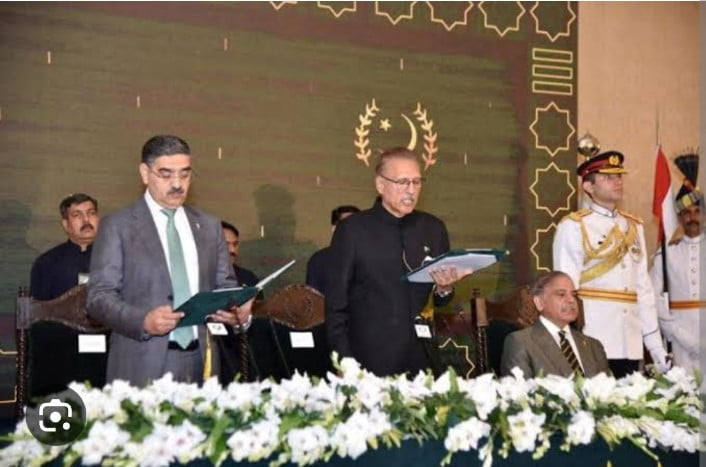Harbinging a Paradigm of Harmonious Governance in Interim Phase*
In a didactic symposium, the current Interim Premier, Anwaarul Haq Kakar, lucidly underscored the immutable significance of safeguarding societal order even in the face of institutional legalism. With eloquent erudition, he navigated the nuanced terrain of governance, championing the imperative of striking an intricate equilibrium between the rule of law and the overarching imperative of social stability.
During an erudite colloquium with a delegation hailing from Harvard University, who are currently on an academic sojourn in Pakistan, Premier Kakar expounded upon the delicate balance requisite for harmonious governance. Notably, these scholars had previously engaged in a dialogue with the Chief of Army Staff, General Asim Munir, further underscoring the pertinence of the discourse at hand.
This intellectually charged interaction culminated in a plethora of discursive realms, encapsulating the expanse of democracy, the intricate contours of the economy, the pernicious phenomenon of brain drain, and the multifaceted challenges that Pakistan navigates in its perennial struggle against terrorism.
At the very crux of his discourse, Premier Kakar delved into the intricate dialectic between the temporal stability of governmental tenures and the foundational tenets of democracy. He emphatically demystified the notion that the truncation of governmental mandates is inherently antithetical to democratic principles, propounding a trenchant counter-narrative to this conjecture.
“Democracy is not tethered to the finality of administrative tenures,” avowed Premier Kakar, as he expounded upon the dynamic tapestry of participatory governance. Casting a retrospective gaze upon the post-2008 trajectory of Pakistan’s democratic evolution, he adroitly delineated how the tapestry of parliamentarianism had been intricately woven through successive triennial sojourns. Undoubtedly, he proffered, these democratic evolutions find their genesis in the hallowed corridors of the constitution itself.
Moreover, Premier Kakar resoundingly affirmed the inviolable prerogative of parliamentary members to orchestrate the dynamic ingress and egress of governments. “The crucible of parliament resonates with the essence of governance,” he averred, espousing the supremacy of the legislature in executing transitions of authority. He bolstered his exposition by expatiating upon the authenticity of parliamentary agency as an instrument of executive transition, an aspect emblematic of Pakistan’s democratic landscape over the past decade and a half.
In a sagacious soliloquy, Premier Kakar discerningly gauged the prevailing global currents, offering an implicit comparative scrutiny of democratic norms in India. Evidencing a mordant acumen, he articulated how the perennial ceremonial of democracy in India has, over time, metamorphosed into a potential precipice towards electoral autocracy. Unquestionably, his invocation resonated as a clarion call for substantive democratic vigilance and adherence to the foundational principles of participatory governance.
Balancing the dialectic between the rule of law and the imperatives of social cohesion, Premier Kakar unveiled a cogent framework predicated upon strategic temporal oscillations. “Contextual exigencies,” as he termed them, could occasion momentary suspensions of conventional legal paradigms. This, he elucidated, can pave the way for safeguarding life, social fabric, and political stability, ultimately manifesting as a prophylactic conduit to safeguard democratic principles in extenuating circumstances.
In tandem with his sagacious insights, Premier Kakar’s oratory traversed the vistas of international dynamics. Notably, he framed Pakistan’s relationship with the United States within the contextual arena of global technology and innovation. Girded by rational discourse, he advocated for a pragmatic engagement while emphasizing the tenets of independent appraisal and dissent.
Cognizant of Pakistan’s role in global economics, Premier Kakar reverberated the nation’s pivotal role in sustaining the capitalist edifice during pivotal junctures of history. His veracious valorization of Pakistan’s contributions to the global economic tableau, vis-à-vis its entwinement with the capitalist ethos, encapsulated an aura of historic significance.
Premier Kakar’s visionary encapsulation of Pakistan’s trajectory towards the future unveiled a holistic vision, wherein the symbiosis between societal rights and civic obligations emerges as the fulcrum of a newfound social compact. His esoteric enunciation of Pakistan’s voyage towards socio-economic transformation, underscored by the crucible of security imperatives, bore the imprints of a statesman navigating a labyrinthine phase with sagacity and vision.
His address culminated with a clarion call for recalibrating revenue generation and augmenting the national tax-to-GDP ratio, coupled with strategic investment in human resources and the ascendancy of the services sector. Through this erudite exposition, Premier Kakar emerged as a beacon of pragmatic governance, steadfastly steering Pakistan towards the crossroads of governance and societal well-being.




